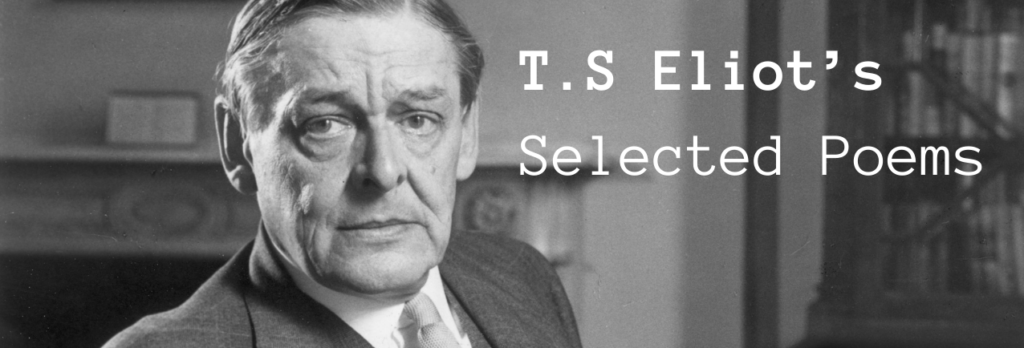
Introduction
T.S Eliot’s oeuvre ‘Selected Poems’, is at its foundation, a disclosure of the fundamental isolation of modern man in a sordid world. This experience encapsulates the feelings of loneliness and spiritual vacancy, which ultimately lead to a pointless existence. It is in Eliot’s body of work, The Lovesong of Alfred J. Prufrock, The Hollow Men, Preludes, Rhadospy on a windy night and Journey of the Magi, that the core modernist preoccupation of alienation is revealed through unique and complex voices of all his poetry. Eliot employs personas as a medium to reflect the fragmented and confused consciousness of individuals who attempt to find meaning in the modern world. It is through Eliot’s skillfully portrayal of this notion that he is not only able to capture the human condition of isolation of his own contextual reality but more profoundly expresses this as a universal truth that strikes the chord of emotional truth for the contemporary world due to its pertinence; inevitably contributing to the organic unity and enduring value of his poetry.
Poem 1: The Lovesong of Alfred J. Prufrock
It is through Prufrock’s interior monologue that Eliot provides a personal reflection of the universal struggles of alienation and loneliness faced by any young intellectual living in a sordid, modern world. Eliot establishes the context of the modern world by revealing how its society’s over-critical attitudes can ultimately prevent an individual to feel a sense of belonging through the disembodiment of “the eyes that fix you in a formulated phase… Then how should I begin”. This symbolises how this persona view’s modern society as being detached from mind and body, but also Prufrock’s anxiety of witnessing individuals “fix” their eyes on him, attentively judging him. Accompanied by the violent metaphor of “sprawling” helplessly “on a pin”, Eliot reveals how Prufrock becomes paralysed by the modern code of living and the impossibility of interacting with society, let alone fitting in. Prufrock’s tendency to postpone initiating any interaction is expressed a direct response to the feelings of isolation he feels within society, as he comforts himself that “There will be time, there will be time… And time yet for a hundred indecisions… Before the taking of a toast and tea”.
The repetition of “time” shows Prufrock’s unhealthy relationship with it, as his mind over analyzes the future and the consequences of socialising rather than doing so in the present, which according to McGraw-Hill’s Guide to English Literature (1985) reveals “an intensely anxious and important one in that the speaker is unable to draw conclusions about anything”. Eliot highlights the extent to which Prufrock self-deprecates himself as a result of feeling alienation through the zoomorphic imagery suggesting that he “should have been a pair of ragged claws/ scuttling across the floors of silent seas”, as he symbolically represents a creature low on the biological scale that instinctively acts out their lives on the ocean bed. This showcases Prufrock’s existentialist thoughts of wanting to escape the burdens of consciousness and violation that come with the modern world, even if it means being a fraction of a primitive sea creature. Thus, Prufrock’s introspection is a portrait of not only Eliot’s personal social anxieties but that of every individual of the modern world. It reveals that the expectations set by modern culture can cause inner-conflict within those who see past its superficial nature, yet still feel pressured to conform in order to feel a sense of belonging.
Poem 2: The Hollow Men
The Hollow Men conveys a perpetual understanding of isolation through an anonymous group of men that seek spiritual salvation in a depraved world. Through the fragmented voices of these men, Eliot channels his despair of living an inauthentic existence, by revealing the impossibility of preventing the primary modern condition of alienation. This is foreshadowed in the epigraph “Mistah Kurtz – he dead”, as it serves the purpose of contextualising the poem literarily and historically in order for the audience to speculate that like Kurtz from the Heart of Darkness, the hollow men possess no emotional depth due to the materialistic world in which they live in. The loss of interpersonal connection is expressed as a product of the spiritually vacant world in the introductory stanza, when the men intonate, “W e are hollow men, We are stuffed men”. The use of binary opposition reveals the paradox of these personas, “stuffed” with knowledge yet “hollow”, implying that simply knowing poses no real significance as it does not add depth to one’s emotional being. In addition, the use of the inclusive pronoun “we” further reinforces the emotional truth on the fragmented modern society, as it subjects this accusation to all those that live in the modern era, that feeling emptiness is an inherent part of modernity which no one can escape from.
Nevertheless, these hollow men attempt to latch onto the past world, where transcendental spirituality strengthened the connections between one’s emotions and each other, presenting itself as “the only hope of empty men”. However, as David Spurr states in his Conflicts in Consciousness (1984) this “paradoxical search for a more enduring form of order is tried through acts of denial and alienation”, ultimately expressing the inevitability of attaining salvation; revealed when the men attempt to recite fragmented verses of the Lord’s Prayer, there “falls a shadow… in between the idea and reality.” The shadow symbolises the fear and nothingness of the modern world, acting as an unbreakable barricade that disables even religious scriptures in bringing salvation to these men. The use of “in between” further reveals that the immobility of these men, as the “idea” and “reality” are abstractions that will never unite, implying that these men will remain in a transient void. Thus this poem recognises the doomed condition of human beings in the modern world, that no individual can prevent themselves from feeling alienated, and by denying reality and seeking spiritual assistance, humanity is resolved to a type of stasis.
Find out more about our English tutoring services in person by finding a nearby campus or online session.




